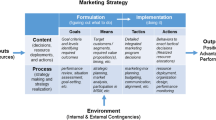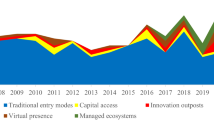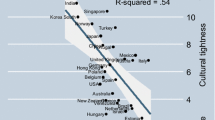Abstract
Why do marketing managers in the transitional economies of Eastern Europe and China often engage in competitively irrational behavior, choosing pricing strategies that damage competitors’ profits, rather than choosing pricing strategies that improve their firm’s profits? We propose one possible reason, the moral vacuum created by the collapse of communist ideology. We hypothesize and find that managers who experienced formal communist moral ideological indoctrination are less likely to be competitively irrational than the post-communist managers who did not. Implications are discussed.
Similar content being viewed by others
References
Ahmed M. M., K. Y. Chung, J. W. Eichenseher 2003, Business Students’ Perception of Ethics and Moral Judgment: A Cross-Cultural Study. Journal of Business Ethics 43(1–2):89–102
Al-Khatib J. A., C. J. Robertson, D. N. Lascu 2004, Post-Communist Consumer Ethics: The Case of Romania. Journal of Business Ethics 54(1):81–95
Allen J., D. Davis 1993, ‹Assessing Some Determinant Effects of Ethical Consulting Behavior: The Case of Personal and Professional Values’. Journal of Business Ethics 12(6):449–459
Arendt H. 1978. The Life of the Mind. San Diego, New York, and London: Harcourt, Brace and Jovanovich
Armstrong J. S., F. Collopy 1996, Competitor Orientation: Effects of Objectives and Information on Managerial Decisions and Profitability. Journal of Marketing Research 33(2):188–199
Arnett D. B., S. D. Hunt 2002, Competitive Irrationality: The Influence of Moral Philosophy. Business Ethics Quarterly 12(3):279–303
Batjargal B. 2003, Social Capital and Entrepreneurial Performance in Russia: A Longitudinal Study. Organization Studies 24(4):535–556
Buck T. I., P. Filatotchev, M. Nolan, J. Wright 2000, Different Paths to Economic Reform in Russia and China: Causes and Consequences. Journal of World Business 35(4):379–400
Chang T. -S., G. Cui 2004, Consumer Attitudes Toward Marketing in a Transitional Economy: A Replication and Extension. Journal of Consumer Marketing 21(1):10–26
Cooke F. L. 2005, Women’s Managerial Careers in China in a Period of Reform. Asia Pacific Business Review 11(2):149–162
Crellin M. 1998, Young China Welcomes West. Marketing Week 21(20):38–40
Cyriac K., R. Dharmaraj 1994, Machiavellianism in Indian Management. Journal of Business Ethics 13(4):281–286
Ferrell, O. C., L. G. Gresham and J. Fraedrich: 1989, ‹A Synthesis of Ethical Decision Models for Marketing’, Journal of Macromarketing 9(2), 55–64
Finlay J. L., M. Neal, A. Catana, D. Catana 2003, Anticipated Management Styles: Viewpoints of Potential Women Employees from Selected Evolving Economies. Economic and Business Review for Central and Southeastern Europe 5(4):285–308
Florcruz, J. A., J. C. Ramo, C. Jian and M. Turner: 1999, ‹Inside China’s Search for Its Soul,’ Time, October 4, 154(4), 68–73
Forsyth D. R. 1980. A Taxonomy of Ethical Ideologies. Journal of Personality and Social Psychology 39(1):175–184
Forsyth D. R. 1992, Judging the Morality of Business Practices: The Influence of Personal Moral Philosophies. Journal of Business Ethics 11(5/6):461–470
Frank R. H., T. Gilovich, D. T. Regan 1993, Does Studying Economics Inhibit Cooperation? Journal of Economic Perspectives 7(2):159–171
Ger G., R. W. Belk 1996, Cross-Cultural Differences in Materialism. Journal of Economic Psychology 17(1):55–78
Ger, G., R. W. Belk and D. N. Lascu: 1993, ‹The Development of Consumer Desire in Marketizing and Developing Economies: The Case of Romania and Turkey’, in L. McAllister (ed.), Advances in Consumer Research, vol. 20 (Association for Consumer Research, Provo, Utah), pp. 102–107
Gibson K. 2000, The Moral Basis of Stakeholder Theory. Journal of Business Ethics 26(3):245–257
Goldman M. 1998, The Russian Ruble and Why It Collapsed. Challenge 41(6):9–13
Grachev M. V. 2003, Cultural Attributes of Russian Management. In: J. L. C. Cheng, M. A. Hitt (eds) Advances in International Management, 15. Elsevier Science Ltd.: Oxford, U.K.
Griffith D. E., R. T. Rust 1997, The Price of Competitiveness and Competitive Pricing. Journal of the Academy of Marketing Science 25(2):109–116
Harvey B. 1999, Graceful Merchants: A Contemporary View of Chinese Business Ethics. Journal of Business Ethics 20(1):85–93
Hisrich R. D., M. V. Grachev 1995, The Russian Entrepreneur: Characteristics and Prescriptions for Success. Journal of Managerial Psychology 10(2):3–10
Hitt M. A., D. Ahlstrom, M. T. Dacin, E. Levitas, L. Svobodina 2004, The Institutional Effects on Strategic Alliance Partner Selection in Transition Economies: China v. Russia. Organization Science 15(2):173–185
Hitt M. A., Barr S. H. 1989, Managerial Selection Decision Models: Examination of Configural Cue Processing. Journal of Applied Psychology 74 (1):53–61
Hunt S. D., S. Vitell 1986, A General Theory of Marketing Ethics. Journal of Macromarketing 6(1):5–15
Hunt S. D., S. Vitell 1993, The General Theory of Marketing Ethics: A Retrospective and Revision. In: Smith N. C., J. A. Quelch (eds) Ethics in Marketing. Boston, Mass: Irwin, pp 775–784
Jaffe E. D., A. Tsimerman 2005, Business Ethics in a Transition Economy: Will the Next Russian Generation Be Any Better? Journal of Business Ethics 62(1):87–97
Johnson S., D. Kaufmann, J. McMillan, C. Woodruff 2000, Why Do Firms Hide? Journal of Public Economics 76(3):495–520
Kasparov, G.: 2005, ‹The Wild, Wild East’, The Wall Street Journal, November 18, 16A
Khan, J.: 2006, ‹Sharp Debate Erupts in China Over Socialism and Capitalism’, The New York Times, March 12, p. 1
Khatri N., E. W. K. Tsang, T. Begley 2006, Cronyism: A Cross-Cultural Analysis. Journal of International Business Studies 36(1):61–75
Lascu D., L. Manrai, A. Manrai 1996, Environmental Dimensions of Emerging Markets: Introducing a Region-Relevant Market Analysis Matrix. Journal of East-West Business 3(1):27–42
Li S. 2005, Corruption by Design: Building Clean Government in Mainland China and Hong Kong/ Corruption and Market in Contemporary China. Far Eastern Economic Review 168(3):68–72
Lukes S. 1983, Marxism and Morality. Oxford: Clarendon Press
Marquand, R.: 2006, ‹New Struggle in China: Keep Up with the Chans’, The Christian Science Monitor, January 18, 2006, p. 1
Merlyn, T.: 2001, ‹The Hero’s Journey: Marxism, Morality, and the Literature of Eric Lambert’, in E.␣Ruinard and E. Tilley (eds.), Journal of Australian Studies: Fresh Cuts: New Talents, p. 67
Metcalfe B. D., M. Afanassieva 2005, Gender, Work, and Equal Opportunities in Central and Eastern Europe. Women in Management Review 20(6):397–402
Naughton B. 1996, Growing Out of the Plan: Chinese Economic Reform, 1978–1993. Cambridge University Press: New York
Opdyke, J. D. and L. Santini: 2005, ‹Emerging Ways to Invest in the Wild, Wild East’, The Wall Street Journal, March 9, p. D1
Orwig S. F. 2002, Business Ethics and the Protestant spirit: How Norman Vincent Peale Shaped the Religious Values of American Business Leaders. Journal of Business Ethics 38(1/2):81–89
Pew Global Attitudes Project: 2002, ‹The Pew Research Center for the People & the Press’, Washington, D.C., December 19, 2002
Pipes, R.: 2006, ‹Why the Bear Growls’, Wall Street Journal, March 1, A14
Reed, J. and E. Portanger: 1999, ‹Bribery, Corruption Are Rampant in Eastern Europe, Survey Finds’, The Wall Street Journal, November 9, p. A 21
Risman B. J. 1998, Gender Vertigo: American Families in Transition. New Haven, Connecticut: Yale University Press
Rosefielde S. 1999, Russia’s Warped Transition: The Destructive Consequences of Ethically Unconstrained Utility Seeking. Eastern Economic Journal 25(4):459–478
Schlenker B. R., D. R. Forsyth 1977, On the Ethics of Psychological Research. Journal of Personality 37(3):225–252
Skidelsky R. 1995, The World After Communism: A Polemic for Our Times. London, U.K.: Macmillan
Smith P. B., M. F. Peterson 2005, ‹Demographic Effects on the Use of Vertical Sources of Guidance by Managers in Widely Differing Cultural Contexts. International Journal of Cross Cultural Management 5(1):5–26
Smith P. B., M. F. Peterson, Z. M. Wang 1996, The Manager as Mediator of Alternative Meanings: A Pilot Study from China, the USA and U.K. Journal of International Business Studies 27(1):115–137
Sparks J. R., S. D. Hunt 1998, Marketing Researcher Ethical Sensitivity: Conceptualization, Measurement, and Exploratory Investigation. Journal of Marketing 62(2):92–109
Spence M. T., M. Brucks 1997, The Moderating Effects of Problem Characteristics on Experts’ and Novices’ Judgments. Journal of Marketing Research 34(2):233–247
Su C., R. K. Mitchell, J. M. Sirgy 2007, Enabling Guanxi Management in China: A Hierarchical Stakeholder Model of Effective Guanxi. Journal of Business Ethics 71(3):301–319
Sun Y. 2001, The Politics of Conceptualizing Corruption in Reform China. Crime, Law, and Social Change 35(3):245–270
Trevino L. K. 1986, Ethical Decision Making in Organizations: A Person-Situation Interactionist Model. Academy of Management Review 11:601–617
Woodbine G. F. 2004, Moral Choice and the Declining Influence of Traditional Value Orientations Within the Financial Sector of a Rapidly Developing Region of the People’s Republic of China. Journal of Business Ethics 55(1):43–60
Woodbine G. F., D. Taylor 2006, Moral Choice in an Agency Framework: The Search for a Set of Motivational Typologies. Journal of Business Ethics 63(3):261–277
World Values Survey 1995–1997, Ann Arbor, Mich.: Interuniversity Consortium for Political and Social Research
Yao S. 2002, Privilege and Corruption: The Problems of China’s Socialist Market Economy. American Journal of Economics and Sociology 61(1):279–299
Yardley, J.: 2006, ‹China Attacks Its Woes with an Old Party Ritual’, The New York Times, March 9, 1
Zukowski R. 2005, Corruption in Post-Communist Europe: Immorality Breeds Poverty. Journal of Social, Political, and Economic Studies 30(1):9–41
Author information
Authors and Affiliations
Corresponding author
Rights and permissions
About this article
Cite this article
Brouthers, L.E., Lascu, DN. & Werner, S. Competitive Irrationality in Transitional Economies: Are Communist Managers Less Irrational?. J Bus Ethics 83, 397–408 (2008). https://doi.org/10.1007/s10551-007-9627-6
Received:
Accepted:
Published:
Issue Date:
DOI: https://doi.org/10.1007/s10551-007-9627-6




